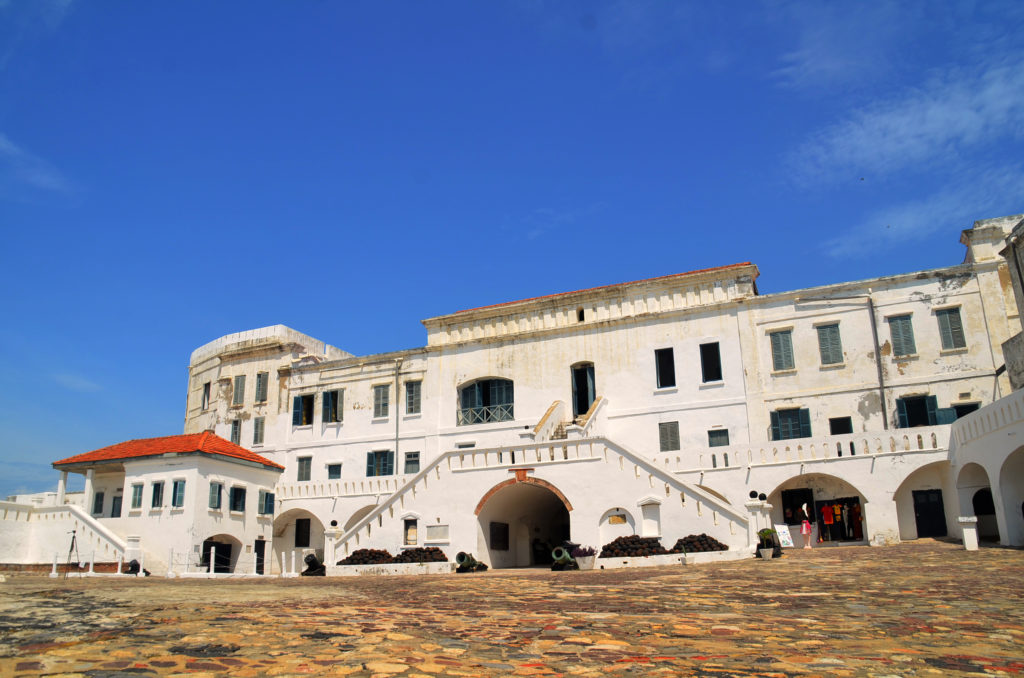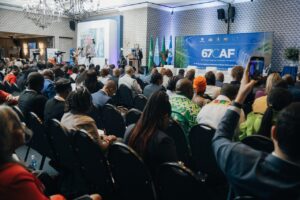Picture:The courtyard of Ghana’s Cape Coast Castle, a UNESCO Heritage site. It attracted lots of tourists during the Year of return-2019
For many years, the hospitality, travel, tourism and events industry (HTTTE) made the world go round. Airplanes dominated the air and airports were bustling cities, until they became the vehicle of transfer of the n-COVID- 19 virus, then they became ground zero. Borders have had to be closed to all categories of travelers, social events have been curtailed to stem the tide of the virus which has infected one million people and claimed more than sixty thousand lives globally. The travel tourism, hospitality, and events sectors, as well as affiliate sectors such as photo, videography, e- transport and accommodation ( such as Uber and Airbnb) have been brought to their knees. Global and local markets have all but collapsed and governments around the world are in dire straits trying to strike a balance between keeping their market economies going, averting unemployment and deprivation of the poor while trying to respond to public health essentials.
Indeed, the travel and tourism industry was the first economic casualty of the n-COVID-19 virus. Millions of jobs worldwide have been lost. On 3rd April 2020, Boeing announced voluntary retirement for its staff. Ghana’s Beyond the Return initiative has had to be muted. While some have blamed the travel and tourism industry for being inadvertent catalysts of the virus globally, we must not forget the many ways in which the industry has been part of the solution. Italy, which has been hard hit has had to convert hotels to function as hospitals. In Ghana, 2 top hotels offered their accommodation facilities to host travelers on mandatory quarantine.
Interestingly, before the coronavirus, there were concerns about over-tourism, (the overcrowding from the excess influx of tourists which often, result in conflicts with locals) as well as the exceeding of ecological thresholds and climate change due to tourism. Now it seems the pendulum has swung to the other end and under-tourism is what we may have to worry about. In the current situation are there any lessons to be learned? What has the virus taught us about the travel, tourism industry?
The virus has demonstrated the risk associated with tourism investments. Industry players along the tourism value chain especially those in the private sector, especially Small Medium Scale Enterprises ( SMEs) who have no cushion have lost out, job cuts have been inevitable. Given that the HTTE employs twice as many females, many women have now become economically vulnerable during this time.
The HTTE Post n-COVID -19
Post n-COVID -19, the travel and tourism industry like many others will never be the same again. This means that we cannot go on ‘business as usual’; private, public stakeholders in the tourism industry both locally and internationally will have to rethink a lot of their practices. What measures can adopt to salvage the industry once this crisis blows over?
1.Domestic and Regional Tourism– Ghana will have to aim for and plan to revamp its domestic tourism industry( as measures are put in place to rebuild tourist confidence). International tourism will experience a slump (which will surely pick up the pace again) but that may not be in the short term. However, in the long term, it is expected that the tourism industry will make a strong comeback as this industry is a most resilient one ( think post 9/11). Domestic and regional tourism (within the African continent) will have to be our first point of call. Remember as people have had to be home out of fear of an invisible threat, being locked down for weeks or even months will need a psychological letdown and let out. Tourism and leisure here can play its role in helping people recover and rediscover nature.
2. Digitizing tourism resources – one option will be for Ghana to keep its name on the tourism map by organizing virtual events to showcase cultural and heritage resources such as the Elmina, Cape Coast Castle, and all the other vestiges of our colonial past dotted along the coast. The Ghana Museums and Monuments Board ( GMMB) must lead the way in this process. Vested organizations, graphic designers, IT experts, filmmakers and photographers (such as Yaw Pare, Emmanuel Bobbie, Michael Kwame Dakwa) need to work collaboratively to digitize all these resources. We must create electronic and virtual tourism options. In this cause, Small Medium Enterprises in the tourism value chain will need to be supported by the state to keep open because they will be the driving force behind the industry’s recovery.
3. Collaboration– This is the time for collaboration. Collaboration and cooperation are necessary for hotels and all other players in the industry. The current lockdown period can be used to establish or reinforce good collaborative practices and strategies for the industry.
4. Leadership– In the coming days, proactive leadership will be crucial. Leaders in the tourism regulatory agencies in Ghana, namely Ministry of Tourism ( MoT), Ghana Tourism Authority ( GTA), Ghana Tourism Development Corporation Limited (GTDC), unions such as Ghana Tourism Federation ( GhaoF) and its umbrella organizations such as Tour Operators Union of Ghana (TOUGHA), will determine the fate of Ghana’s tourism industry. Leaders must take feedback and consult with their stakeholders including the end consumer. Government leadership in terms of economic policies and stimulus packages to support the aviation industry and SMEs during the lockdown period is essential to keep them afloat till the crisis subsides, else, there will be no industry to go back to post COVID-19.
5. Role of Academics and data analysts– Now more than ever and in the coming days, tourism academics need to step up and contribute research-based, data-driven ideas and solutions to support what will be left of the HTTE industry. Data will have to be collected and tracked to help stakeholders make informed decisions. Academics will need to support new creativity and new opportunities that will be created in the recovery stages. Tourism education will have to be changed entirely to reflect new realities.
6. Planet and People Matter– Ultimately, tourism depends on the environment and people. If there is anything the novel coronavirus has taught us, it is that the earth will fight back if we do not protect it. We must reimagine what sustainable tourism is for Ghana and Africa. Communities of people are important, without that, there can be no travel and tourism. Tourism futures must take cognizance of the fact that the earth has enough to support everyone’s need if we are sustainable, but enough to support corporate greed.
Concluding thoughts
There is a lot of uncertainty, and the future is unpredictable for the whole world. One thing we do know is that travel hospitality and tourism will never be the same again. It is time to ‘reinvent’ travel and tourism for the sake of the people and planet. Nature has given us a second chance to rethink our trajectory. Work and recreation must be restructured, and leisure reconfigured to prioritize wellbeing and equity and the long-term sustainability of the world rather than just profit and ambition. In the meantime, let us stay put, let us stay home today and dream of travel tomorrow.
Author:
Dr. Esi Akyere Mensah is the Acting Head, Department of Management and Human Resources at the Faculty of I.T Business, Ghana Technology University College (GTUC). She has a Ph.D. in Tourism Management from the University of Cape Coast and is passionate about volunteer and sustainable tourism in developing countries.









